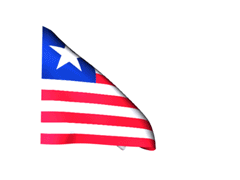
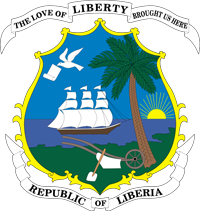


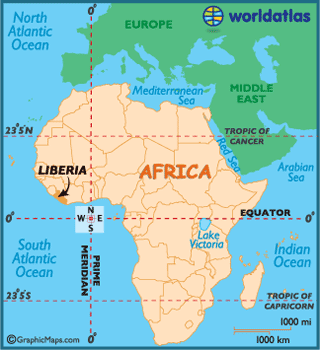
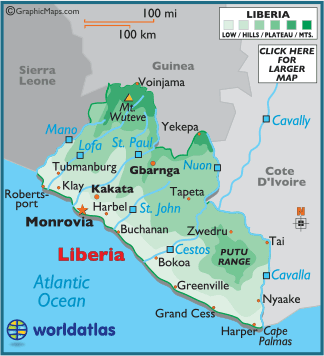
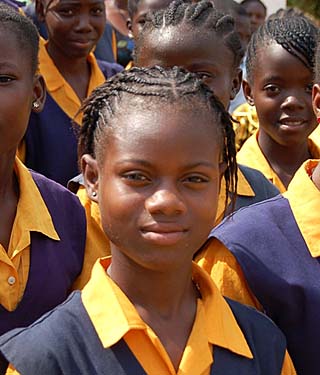
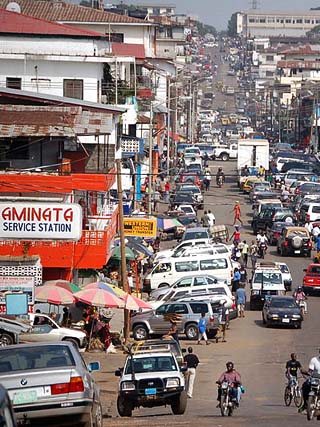
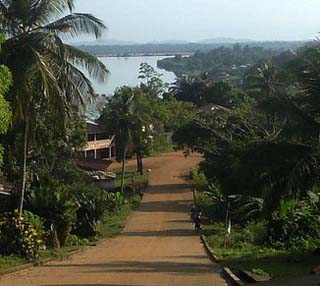
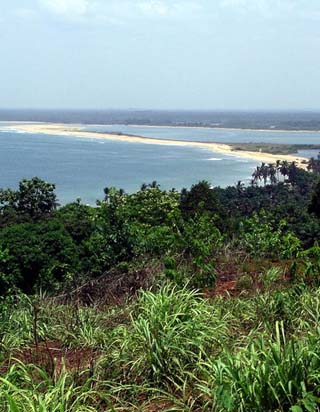
Tel Code..: +231
Lufthansa - British Air Ways
Viza..: Needs
Courses or boosters usually advised: Hepatitis A; Poliomyelitis; Tetanus; Typhoid; Yellow Fever.
Other vaccines to consider: Cholera; Diphtheria; Hepatitis B; Meningococcal Meningitis; Rabies.
Yellow fever vaccination certificate required for travellers over 1 year of age arriving from countries with risk of yellow fever transmission.
Name: Liberia
Liberia is one of the very few African countries
not colonized by a European country, and subsequently established a unique
relationship with the Unites
States.
The country was in fact founded and colonized by freed American slaves with the
help of a private organization called the American Colonization Society in
1821-1822
That concept was based on the premise that former American slaves would have
greater freedom and equality in Africa.
In that regard, slaves freed from other slave ships also were sent there instead
of being repatriated to their countries of origin.
Those black colonists formed an elite group in Liberian society, and, in 1847,
they founded the Republic of Liberia, establishing a government modeled on that
of the Unites
States.
They named their capital city Monrovia, after James Monroe, the fifth president
of theUnites
States.
Prior to this colonization, the region was known as Costa de Pimenta (Pepper
Coast), due to the amount of melegueta pepper, and was inhabited by Mende-speaking
peoples as far back as the 12th century.
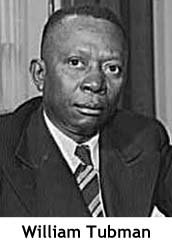 By 1847, the Americo-Liberians
were able to establish a republic.
By 1847, the Americo-Liberians
were able to establish a republic.
From 1944 to 1971, President Tubman put great effort into bridging the political,
economic, and social gaps between descendents of original settlers and
inhabitants of the interior, as well as in promoting of foreign investments.
In 1980, a military coup led by Samuel Doe ushered in a decade of authoritarian
rule.
Subsequently, internal unrest overcame the country as repression grew, and by
December 1989, Charles Taylor launched a rebellion against Doe's regime that led
to a prolonged civil war in which countless thousands were killed, including Doe
himself.
A period of relative peace in 1997 allowed for elections that brought Taylor to
power, but major fighting resumed in 2000. In August 2003, a peace agreement
ended the war and prompted the resignation of Taylor, who was exiled to Nigeria.
He is now on trial in The Hague.
Ellen Johnson Sirleaf was elected president in 2005, and reelected in 2011.
Liberia is still recovering from the lingering effects of civil war and related
economic dislocation. The process of rebuilding the social and economic
structure of this war-torn country is difficult, and statistics indicate that
about 85% of the population live below US$1.25 a day.
Much of Liberia is dominated by flat to rolling coastal plains that contain
mangroves and swamps.
Those plains slope into a rolling plateau and rainforest-covered hills central,
and into relatively low mountains in the northeast.
The country's major rivers include the Mano River in the northwest and the
Cavalla River in the southeast.
The Cavalla is the longest river in the nation at 320 mi (515 km). It was named
by 15th-century Portuguesenavigators
for the cavalla (or horse mackerel) found at its mouth.
Additional rivers of note are the Lofa, St. Paul, St. John and Cestos River, all
of which flow into the Atlantic.
The highest point completely within Liberia is Mount Wuteve at 4,724 ft (1,440
m) located in the WestAfrican Mountain
range, however, Mount Nimba is higher at 5,748 ft (1,752 m) and is shared with
the country ofGuinea and Cote
d'Ivoire.
The lowest point of the country is the Atlantic Ocean.
The climate of Liberia is tropical, meaning that it is generally hot and humid
throughout the year.
Its dry season takes place during winter with hot days and cool to cold nights;
summers are cloudy and wet with frequent heavy showers.
Liberia's average temperature remains close to 70°F (21°C) and never exceeds
100°F (37°C).
The civil warfare that raged from 1990 to 1997 and from 2001 to 2003 had a disastrous effect on the Liberian economy, with many business people fleeing the country as rebels gained control of vast quantities of gold, diamonds, natural rubber, and tropical hardwoods. Until the 1950s, Liberia's economy was almost totally dependent upon subsistence farming and the production of rubber. The American-owned Firestone plantation was the country's largest employer and held a concession on some one million acres (404,700 hectares) of land. With the discovery of high-grade iron ore, first at Bomi Hills, and then at Bong and Nimba, the production and export of minerals became the country's major cash-earning economic activity. Gold, diamonds, barite, and kyanite are also mined. Mineral processing plants are located near Buchanan and Bong.
About 70% of the population work in the agricultural sector, which produces rubber, coffee, cocoa, rice, cassava, palm oil, sugarcane, and bananas. Sheep and goats are raised, and there is lumbering. Much rice, the main staple, is imported, but efforts have been made to develop intensive rice production and to establish fish farms. Much of the country's industry is concentrated around Monrovia, where civil war disruption was highest, and is directed toward mineral, rubber, and palm oil processing. The lack of skilled and technical labor has slowed the growth of the manufacturing sector.
The government derives a sizable income from registering ships; low fees and lack of control over shipping operations have made the Liberian merchant marine one of the world's largest. Internal communications are poor, with few paved roads and only a few short, freight-carrying rail lines. Rubber, timber, iron ore, diamonds, cocoa, and coffee provide the bulk of the export earnings; fuels, chemicals, machinery, transportation equipment, manufactured goods, and foodstuffs are the principal imports. In general, the value of imports greatly exceeds that of exports, and the country has accumulated massive international debts. Liberia's main trading partners are Belgium, South Korea, and Japan.
Liberia is governed under the constitution of 1986. The executive branch is headed by a president, who is popularly elected for a renewable six-year term. The president is both the head of state and the head of government. The bicameral legislature, the National Assembly, consists of the 30-seat Senate, whose members are popularly elected for nine-year terms, and the 64-seat House of Representatives, whose members are popularly elected for six-year terms. Administratively, Liberia is divided into 15 counties.
The majority of the population belong to 16 ethnic groups, including the Kpelle,
the Bassa, the Gio, the Kru, the Grebo, and the Mano. Traditional religions are
practiced by about 40% of the people; another 40% are Christian, and 20% are
Muslim. English is the official language, but is spoken by only about 20% of the
people; African languages are used extensively. Far less numerous, but of great
political importance in the past, are the descendants of freed slaves who
immigrated from the United States to Liberia in the 19th cent. These people,
formerly called Americo-Liberians, are concentrated in the towns, where they
have provided the country's Westernized leadership and, for the most part, are
adherents of various Protestant denominations. There are also communities of
Lebanese merchants and European and American technicians.